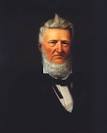Get Today in Masonic History into your Inbox. Sign up today for one of our email lists!
Need an article for your Trestleboard/Newsletter see our Use Policy
David Gouverneur Burnet is Born

Today in Masonic History David Gouverneur Burnet is born in 1788.
David Gouverneur Burnet was an American politician.
Burnet was born in Newark, New Jersey on April 14th, 1788. His father was a member of the Continental Congress. Both of Burnet's parents passed away when he was young.
In 1805, Burnet went to work with an accounting firm. The firm fell on hard times and Burnet put up his personal inheritance, $1,200, to save the firm. The firm eventually went bankrupt and Burnet lost all of his money.
Starting in 1806, Burnet volunteered to fight in the unsuccessful revolt for Venezuela to have independence from Spain. He fought in Chile in 1806 and Venezuela in 1808 eventually returning to the United States. On his return he moved to Cincinnati, Ohio where he began to study law.
In 1817, Burnet moved to Natchitoches, Louisiana to open a mercantile business. Within a few months he developed tuberculosis. His doctor recommended he move to Texas where the dry air helped his ailment. Traveling alone to Texas, Burnet fell off his horse and a Comanche tribe helped him recover. He lived with the tribe for two years.
Eventually Burnet decidee, after his cough had gotten better, to return east. Before leaving the tribe, he convinced the members of the tribe to release the Mexican prisoners they were holding.
Once back in Cincinnati, Burnet began writing for a local paper. He wrote a series of articles about his time with the Comanche tribe. He also spent time practicing law. He returned to Texas when he received the news Stephen F. Austin had built a successful colony in Texas. Once back in Texas, Burnet gave legal advice to the settlers.
In 1827, Burnet successfully sought a land grant as an empersario. Unfortunately once he was back in Ohio he was unable to entice enough settlers to travel to Texas and eventually sold his land grant.
Around 1831, Burnet who was newly married traveled with his wife back to Texas. This time they traveled by steam boat and brought with them a steam engine to use in creating saw mill. Initially it looked like Burnet got a land grant to run his mill. Unfortunately Mexican law at the time required individuals to convert to a Roman Catholic in order to receive the grant. Burnet refused to convert and eventually had to sell his sawmill at a heavy loss.
In 1833, Burnet, at the Convention of 1833, was made the chairman of a committee which created a petition arguing the Mexican Congress approve separate statehood for Texas. Austin took the petition to Mexico City personally and was promptly jailed. Shortly after the Convention of 1833 disbanded, Antonio López de Santa Anna become President of Mexico. Within two years he had declared himself the military dictator of Mexico and was marching his troops north to Texas to "reassert control over Texas".
In 1836, during the attack on the Alamo, the Texas Constitutional Convention of 1836 was happening. When news of the attack at the Alamo reached Burnet he immediately headed out, stopping first at the Convention to recruit additional support. Burnet was pulled into the debates going on and remained as a visitor. Before the end of the day, word came in the Alamo had fallen. When the chairman of the convention wanted to adjourn, Burnet jumped up on a bench and gave a speech encouraging the delegates to finish their work, which they did.
Burnet was nominated and elected as the first interim President of Texas. He served throughout the war for independence. He resigned in October 1836 when the first official election for President of Texas was held. Burnet later ran again for President of Texas and failed in his bid.
Burnet at the end of his life suffered from senility and at one point took a trunk with all of his papers into a field and burned them. He passed away on December 5th, 1870.
Burnet was a member of Holland Lodge No. 1. Holland Lodge No. 1 was the first masonic lodge in the territory of Texas and later the Republic of Texas.

